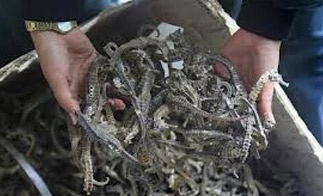Authorities in Peru seized thousands of dried seahorses destined for sale in Asia, illustrating the South American country’s status as a wildlife trafficking hub and Asia’s insatiable appetite for exotic remedies and aphrodisiacs.
On August 23, Peruvian authorities seized the over 16,000 dried seahorses from wildlife traffickers in Lima, BBC reported. Police confiscated the three cases carrying the seahorses after the traffickers dropped them in the street and fled the scene. According to Police chief Victor Fernandez, the seahorses would have earned the traffickers up to $250,000 abroad.
The seahorses, which breed along Peru’s north Pacific coast, are protected by the Convention on International Trade in Endangered Species (CITES). Seahorse fishing has been banned in Peru since 2004 and is punishable by two to five years in prison.
InSight Crime Analysis
Dried seahorses are popular in Asian countries where they are used in traditional medicines and as a supposed aphrodisiac. High demand for seahorse powder makes the trade profitable for traffickers, despite bans. In 2011 alone, Peruvian authorities seized two tons of seahorses destined for export, according to the AFP.
In addition to being a popular source of black market seahorses, Peru is also the source of other exotic animals. In 2009, Chilean authorities captured a boat carrying hundreds of live animals, including toucans and crocodiles, from Peru that were destined for illegal sale.
According to Global Financial Integrity, a branch of the Center for International Policy, the illegal wildlife trade earns traffickers an estimated $7.8 to $10 billion annually. However, many countries do not have sufficient resources to crack down on the trade, which is especially difficult to monitor in largely remote areas where many of the exotic species are found.

